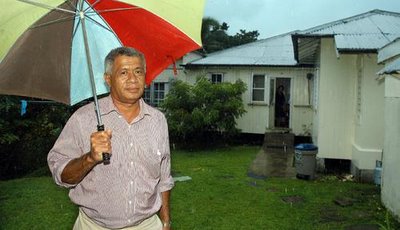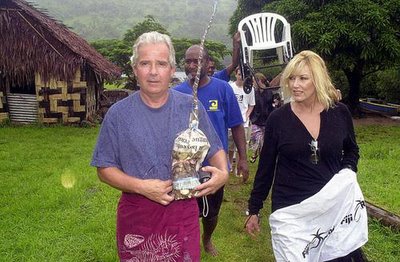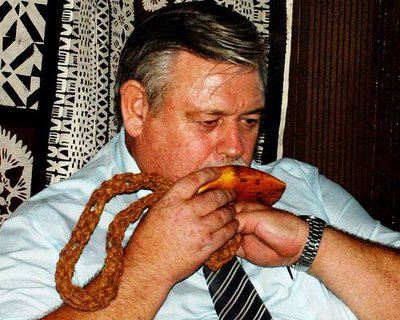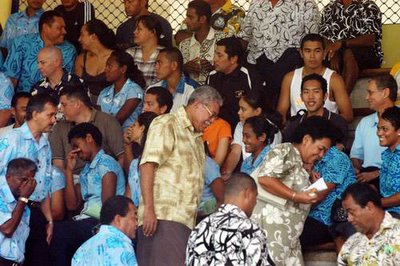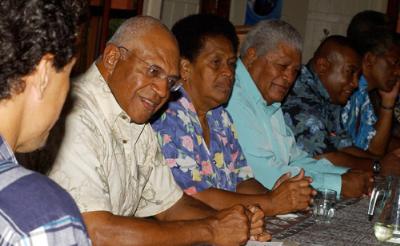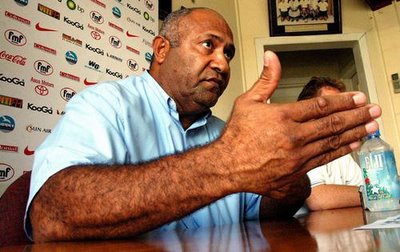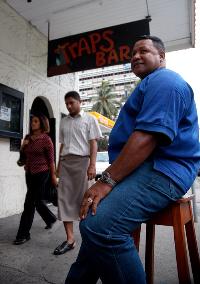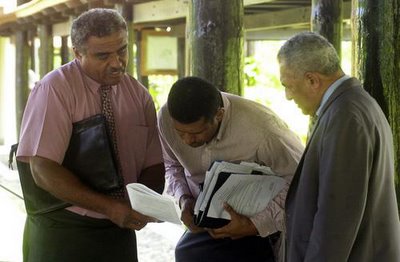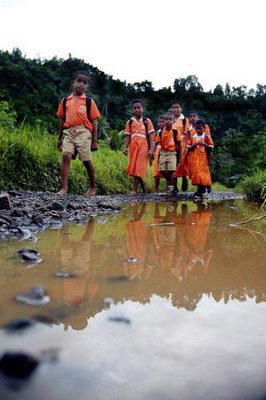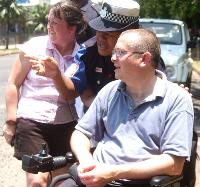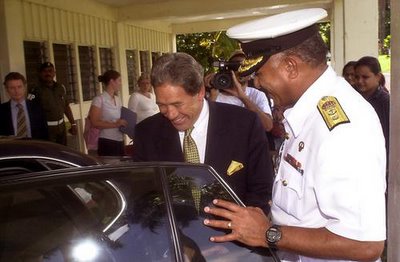
United Nations representatives does not have an O.I.T.C program and raises a lot of questions behind the financiers of the proposed landowners bank.
Fiji Live article unravels more details on the shadowy individual handing out promises.
OITC men linked to imaginary country
Friday March 03, 2006
Keith Scott, The man whose organization has promised more than $11billion to Fiji landowners, had one of his corporations registered in the imaginary entity of the Dominion of Melchizedek.
Ray Chhat Dam (reportedly a Thai national with US citizenship) - alongside other individuals - was linked to an entity called the Consolidated Credit Bank Limited, which is said to have originally obtained a mail order bank license over the Internet from the Australian-based Dominion of Melchizedek.
The Dominion of Melchizedek is a so-called micronation with its own legislation and flag and is listed as being located in various parts of the Pacific Ocean islands and parts of Antarctica, and lays claim to a small island off Rotuma called Solkope.
The Dominion of Melchizedek was implicated in trying to separate Rotuma from Fiji in early 2000 after its leader David Korem visited Rotuma and had drafted a constitution and was planning to help it gain independence.
Dam's "Chief of Cabinet of the Office of International Treasury Control (OITC) as well as his Special Envoy and Executor for His Excellency", Keith Scott, said a Consolidated Credit Bank was initially registered from Melchizedek and then it was shifted to "their own nation".
An Internet search of Consolidated Credit Bank Limited reveals that it is on the blacklist of at least one bank watch website. The bank's website http://www.consolidated-creditbank.com/ has expired.
Scott admitted that the Consolidated Credit Bank had been registered with Melchizedek yet failed to divulge any details about its operations.
"Originally, the Consolidated Credit Bank was listed in the Dominion of Melchizedek. This is part of the normal process of the Melchizedekal system regardless of the secrecy of these assets. What happens is that everything runs under a concept of plausible deniability.
"CCB is not registered in the Dominion of Melchizedek. It was at one stage for certain technical purposes. The original licence came from there and then we took it on under our own nation," Scott said.
Scott, who was scheduled to leave the country tonight, revealed this during the signing of a Memorandum of Understanding between OITC and Fiji's indigenous landowners earlier today.
Without showing any solid evidence of the establishment of his organisation, Scott said OITC resulted from a supposed paper he presented to the United States Federal Reserve in 1998, requesting that Dr Dam be appointed as "the sole arbiter of the centralised wealth of the world, which was controlled under the Federal Reserve under the Bank of International Settlements".
This contradicted his earlier statement that his superior Dr Dam was appointed on January 20 1995 appointed as the sole arbiter.
Scott said funds for OITC was held in a organisation called the Institutional Parent Administration Account. Like the OITC, there is no evidence of this organisation on the Internet.
"The purpose of instituting the OITC was to provide an administrative system in perpetuity, which will be able to exercise the management of these funds and their control," Scott said.
He said prior to today, OITC was a secret organisation and no one knew of its existence.
"The OITC has been up until today a secret organisation known by some particularly in the highest levels of banking. All our funds are held in the Institutional Parent Administration Account of the Federal Reserve System.
"Last night (Thursday Fiji time) I had Dr Dam transfer the first US$3billion."
OITC had initially offered to provide indigenous landowners $F6billion, but during the signing of the MOU, he revealed that the $US3billion was in additional funds.
"This is not the money for setting up the new bank. This is additional money of $US3billion," Scott said.
When asked how his organisation managed to arrange the transfer of $US3billion, Scott responded: "Because I have the authority and the power to do that. We have the money and we can give it to anybody.
"Why don't you just wait and let the funds come into the Reserve Bank? I have already delivered the transfer documents.
"We don't ask the Federal Reserve to send the money, we instruct them."
The Dominion of Melchizedek has attempted for nearly a decade to become recognized amongst other nations as an independent nation, according to the free online encyclopedia, Wikipedia.
While some reports indicate the Dominion of Melchizedek owns no sovereign territory except for perhaps some obscure island territory, DOM is seeking independent nation status via "ecclesiastical statehood", claiming what it believes is a status no different than what The Vatican obtained for its international recognition and relations with other nations.
The Dominion of Melchizedek was created in 1986 by Evan David Pedley and his son, Mark Logan Pedley. The latter also uses a number of pseudonyms, including "Tzemach Ben David Netzer Korem" and "Branch Vinedresser" (which is a rough English translation of the Hebrew). The Pedleys have published a translation of the Bible known as the Melchizedek Bible.
While its flag incorporates Christian, Jewish and Islamic symbols, the Dominion of Melchizedek has no established church or formally constituted religion, and most external observers reject the assertion of ecclesiastical sovereignty.
The Dominion of Melchizedek also claims Jerusalem as its "homeland." The claim is based on the Biblical legend of Melchizedek, who is said to have been priest-king of Salem.
During the 1990s, Dominion of Melchizedek is said to have begun to claim sovereignty over a number of Pacific islands, all of which were already the possessions of recognised states. They include Taongi Atoll (an uninhabited possession of the Marshall Islands); Malpelo Island (a possession of Colombia, inhabited by a military garrison); Karitane Shoal (a reef submerged under 9 metres of water); Solkope Island (part of Fiji off Rotuma), and Clipperton Island (a possession of France). It also claims a large section of Antarctica. None of these claims is recognised by any established government.
The Dominion of Melchizedek website claims that it is a recognized sovereign entity. However, it has been described as "non-existent" by the United States Securities and Exchange Commission
The Dominion of Melchizedek is believed to have been established during the 1980s in the United States by residents of California, Virginia, Chicago, and Texas who saw "agents" being placed in Australia, Canada, The Philippines, Saipan, Guam, Japan, South Africa, Nigeria, Egypt, Saudi Arabia, Switzerland, Belgium, Germany, Luxembourg, The Vatican, Latvia, Bulgaria, Hungary, Russia (CIS), Bulgaria, Bosnia, Chile, Peru, Belgium, and the Caribbean.
The Dominion of Melchizedek amongst other things has been establishing 'identity vehicles' such as banking licenses and passports for many entities and its associates for over 10-years.
Fijilive




